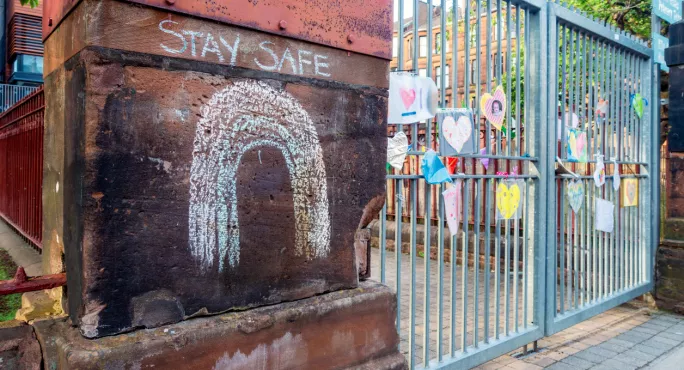Covid: ‘Triple lock’ proposed to stop school closures

MPs are set to discuss a parliamentary bill that would make it harder for schools to be told to switch to remote learning during the pandemic.
Robert Halfon, chair of the Commons’ education select committee, wants to introduce a “triple lock” system of measures designed to prevent school “shutdowns”.
Mr Halfon is due to make the case for his Schools and Education Settings (Essential Infrastructure and Opening During Emergencies) Bill in parliament tomorrow.
‘Huge shambles’: Top Tory on government schools policy
Related: GCSE and A level 2021 exams won’t happen ‘as normal’
Lockdown: Association of Colleges urges DfE to cancel BTEC exams
The proposal is due to be considered under the “10 minute rule” which allows a backbench MP to make his or her case for a new bill in a speech lasting up to 10 minutes.
It already has the support of the current and former children’s commissioners, as well as 12 MPs including two former children’s ministers.
‘Essential infrastructure’
The bill aims to reclassify schools as “essential infrastructure”, which means that they would stay open alongside hospitals, power stations and food retailers in the event of further lockdowns.
As well as redefining schools, the “triple lock” would involve the government seeking the children’s commissioner’s advice on whether national or regional school closures were needed and in children’s best interests.
And the government would need to debate and vote on school closures in parliament.
If closures were approved by parliament, the education secretary would need to seek the advice of the children’s commissioner again, and return to parliament every three weeks for another vote on any proposed extension of closures.
‘Disaster’
Mr Halfon said: “I’m not a lockdown sceptic but I am a school-down sceptic.
“Whilst national lockdowns were important to protect the health of the public, school closures have been nothing short of a disaster for our children,” he added.
Mr Halfon said that before the pandemic, disadvantaged pupils were already a year and a half behind their better-off peers by the time they sat GCSEs, and that these pupils now faced a wider attainment gap and worsened mental health as a result of closures.
“This is why the triple lock in my bill is so important,” he said.
He added: “By ensuring that any decision taken to close schools is done so following the recommendation of the children’s commissioner, is agreed and voted on by a majority of parliament, and is strictly time-limited, we can make sure the best interests of the child are considered at every stage to keep children in school.”
Mental health damage
Dame Rachel De Souza, children’s commissioner, said: “There is nowhere better for children to be than in the classroom. Teachers and schools did amazing things to support children in the last year, but, the virtual environment is a shadow of the real thing. Now we must do everything we can to keep children in school and this bill provides the opportunity to do just that.”
Former children’s commissioner Anne Longfield said: “Children suffered the worst disruption in their education since WWII during the pandemic, and millions have been held back in their learning and suffered serious damage to their mental health as a result - especially the most disadvantaged children.”
But Geoff Barton, general secretary of the Association of School and College Leaders, sounded a note of caution.
He said: “We support the idea of defining schools and other education settings as ‘essential infrastructure’ and doing everything possible to keep them open during times of national emergency.
“However, this would obviously have to take into account public health advice in any future emergency and it must be accompanied by a commitment from the government and from parliament to provide education settings with sufficient support.
‘Thrown under a bus’
“Schools and colleges have been thrown under the bus during the coronavirus pandemic. They have been asked to carry out a range of public health tasks with minimal support from the government, as well as cope with constantly changing guidance and chaotic policy-making.
“Fine words have to be backed up with material support and resources. We hope that politicians will support our call for that to also be a priority.”
Heads have also criticised the bill because they say it “misses the point” when there are record numbers of Covid cases in schools.
Nick Brook, deputy general secretary of the NAHT school leaders’ union, said: “No-one wants to see any further school closures. School leaders have seen firsthand the impact that Covid lockdowns had on the learning and wellbeing of their pupils and they have been working tirelessly to support children since day one of the pandemic.
“But this bill misses the point. Rather than thinking about political mechanisms to prevent school closures, we need the government to do far more to help keep classes open.
“The reality is that currently thousands of pupils are missing out on face to face education as a result of record numbers of Covid cases in schools. Disruption to education is rife because of the government’s failure to do more to prevent the spread of Covid in classrooms.”
You need a Tes subscription to read this article
Subscribe now to read this article and get other subscriber-only content:
- Unlimited access to all Tes magazine content
- Exclusive subscriber-only stories
- Award-winning email newsletters
Already a subscriber? Log in
You need a subscription to read this article
Subscribe now to read this article and get other subscriber-only content, including:
- Unlimited access to all Tes magazine content
- Exclusive subscriber-only stories
- Award-winning email newsletters
topics in this article



